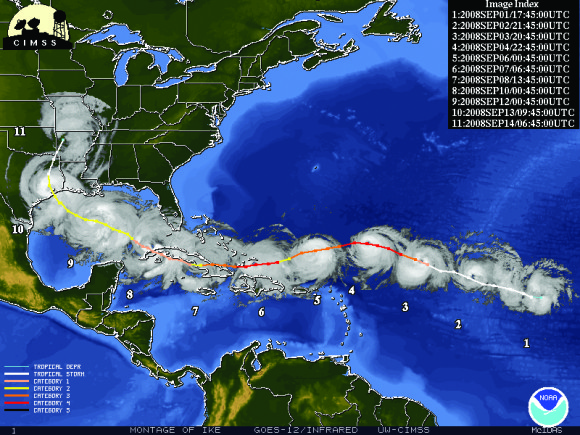While state of the art of hurricane forecasting has improved over the last two decades, coastal exposures and populations at risk have also increased, offsetting those gains. Given the importance of forecasts to the insurance and financial industries, it is important for users of hurricane forecasts to understand what they are – and what they are not.
The primary purpose of hurricane forecasts issued by the National Weather Service is the protection of human life, and support for evacuation decision-making. As such, they are subject to what the forecasters themselves call the “forecast of least regret.”
These forecasters are very conservative with respect to both landfall location and intensity. For example, rather than using the best estimate for the intensity of a storm, they will set the intensity at the upper bound of the intensity estimates. If there is doubt about track or landfall location, they will depict it closer to the coast or major cities. This is perfectly understandable, given their responsibilities.
Given this, damage estimates based on the official public forecasts are almost always on the high side – sometimes significantly so. Damage to a structure is not related to the wind speed in a linear way. The amount of force the wind creates is related to the square of the wind speed. So theoretically the force exerted from a 75-mph wind (a minimal hurricane) is roughly half of the force of a 100-mph wind. But reality is more complex than that, with damage actually calculated from a higher power of the wind speed above a threshold. So for a typical house, a 75-mph wind might cause damage 4 percent of value, whereas a 100-mph wind might cause 25 percent damage. Also, the size of a storm can vary greatly due to phenomena like eyewall replacement cycles and interactions with neighboring weather systems. Thus, even a slight under- or over-estimate of wind speed or size can have major impacts on total forecast damage.
Hurricane Sensationalism
When combined with the media attention surrounding a hurricane landfall, it is no surprise that the ultimate damage is typically not as severe as expected. This creates special problems for the insurance and financial markets, which need accurate estimates to support decisions.
An example of the media bias towards sensationalism is the following story: I was scheduled to be interviewed on a major cable news financial program a couple of days before a recent hurricane landfall. Talking to the producer, I mentioned that our latest model runs were showing lower damage forecasts, and that the financial impacts were not likely to be as great as feared. She sounded disappointed, asking, “Oh, so you’re saying it’s not likely to be as bad as everybody thinks?” She politely said that wasn’t really the angle they wanted to cover. Sadly this is a typical response from news outlets, who often seek to dramatize breaking news.
It makes sense for people to use a bad or even worse case for life and safety, but what about financial decisions? Unbiased forecasts are needed, as well as “worst case” scenarios.
A valuable contribution that the private sector can – and should – make is conveying the uncertainty involved in hurricane forecasting. Private forecasters have more freedom to make unbiased estimates, but they also run the risk of legal action or creating confusion when their forecasts differ from official government sources.
The bottom line is that users of hurricane forecasts should be aware of their intended use, the conscious and unconscious biases of the forecaster, and find the solution that best fits their needs.
Was this article valuable?
Here are more articles you may enjoy.



 Lawyer for Prominent Texas Law Firm Among Victims ID’d in Maine Plane Crash
Lawyer for Prominent Texas Law Firm Among Victims ID’d in Maine Plane Crash  Uber Jury Awards $8.5 Million Damages in Sexual Assault Case
Uber Jury Awards $8.5 Million Damages in Sexual Assault Case  What Analysts Are Saying About the 2026 P/C Insurance Market
What Analysts Are Saying About the 2026 P/C Insurance Market  Florida’s Commercial Clearinghouse Bill Stirring Up Concerns for Brokers, Regulators
Florida’s Commercial Clearinghouse Bill Stirring Up Concerns for Brokers, Regulators 


